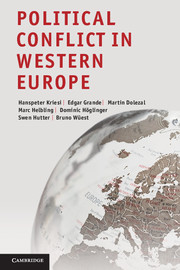Book contents
- Frontmatter
- Contents
- List of Figures
- List of Tables
- Preface and acknowledgments
- Part I Theory and methods
- 1 The transformative power of globalization and the structure of political conflict in Western Europe
- 2 Exploring the new cleavage across arenas and public debates: design and methods
- Part II The development of the ‘integration–demarcation’ cleavage
- Part III Public debates: the articulation of the new cleavage in detail
- Part IV Conclusion
- References
- Index
1 - The transformative power of globalization and the structure of political conflict in Western Europe
Published online by Cambridge University Press: 05 August 2012
- Frontmatter
- Contents
- List of Figures
- List of Tables
- Preface and acknowledgments
- Part I Theory and methods
- 1 The transformative power of globalization and the structure of political conflict in Western Europe
- 2 Exploring the new cleavage across arenas and public debates: design and methods
- Part II The development of the ‘integration–demarcation’ cleavage
- Part III Public debates: the articulation of the new cleavage in detail
- Part IV Conclusion
- References
- Index
Summary
Introduction
What are the consequences of globalization for the structure of political conflicts in Western Europe? How are political conflicts organized and articulated in the twenty-first century? And, more specifically, how does the transformation of territorial boundaries affect the scope and content of political conflicts?
For answering these questions we take as our starting point the political sociology framework of Stein Rokkan, which is firmly based on the assumption that the scope of political conflicts is defined and contained by national boundaries (Lipset and Rokkan 1967; see Rokkan 1999). In the process of nation-building, political conflicts are transformed from local or regional conflicts into national ones; and in those cases in which the former persist they are the basis of a new type of conflict between the national centre and the periphery. In modern democracies, electorates have become national electorates and the most relevant political parties are national parties constituting national party systems (Bartolini 2000a; Caramani 2004). In the present volume, we continue our endeavour to place the current process of globalization in such a Rokkanean perspective. We conceive of the contemporary transformation of territorial boundaries as a new ‘critical juncture’ which results in the formation of a new structural conflict between ‘winners’ and ‘losers’ of globalization or ‘denationalization’.
- Type
- Chapter
- Information
- Political Conflict in Western Europe , pp. 3 - 35Publisher: Cambridge University PressPrint publication year: 2012
- 39
- Cited by



